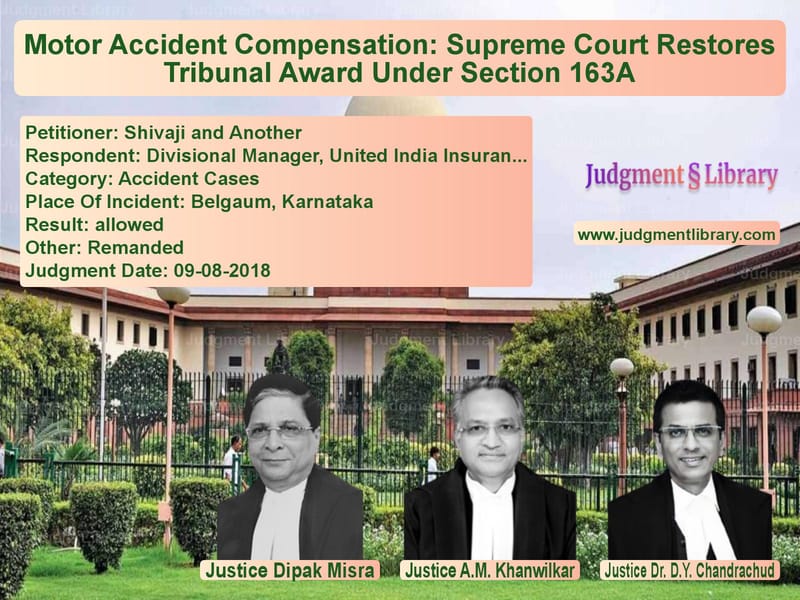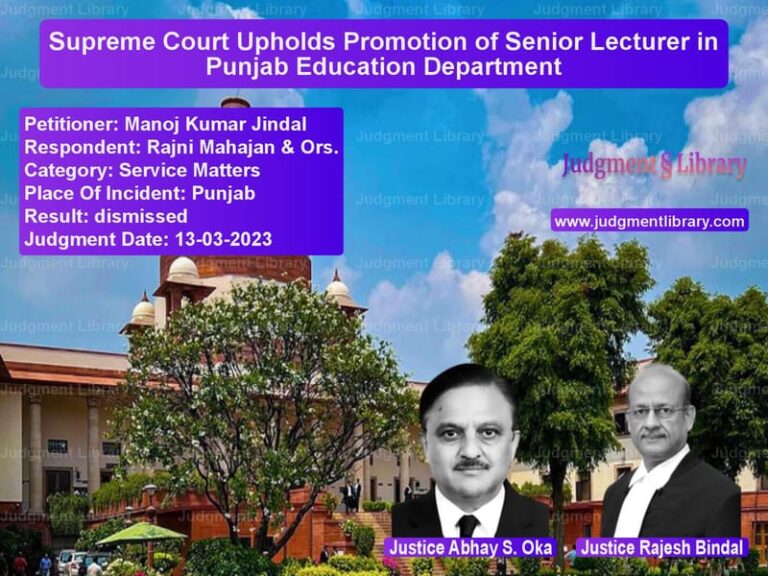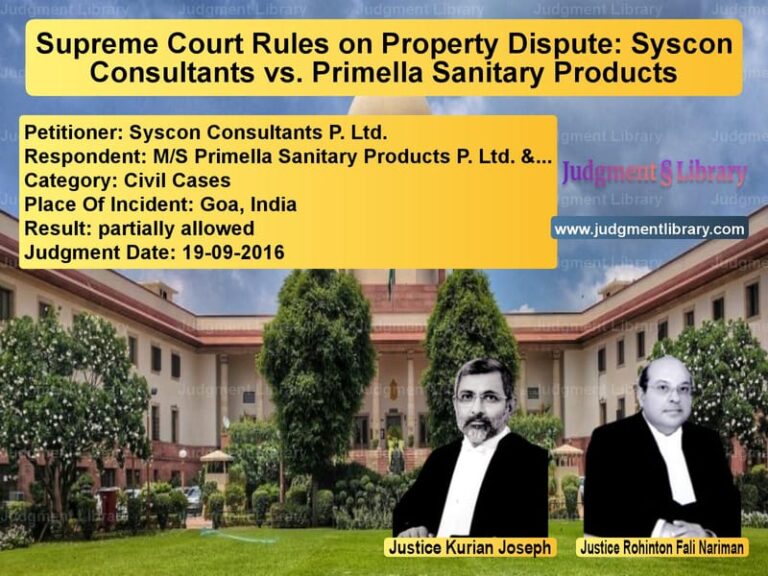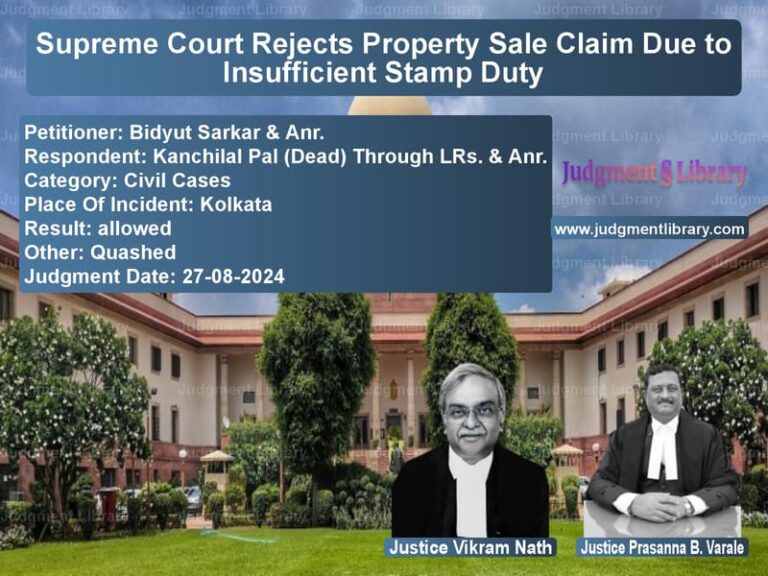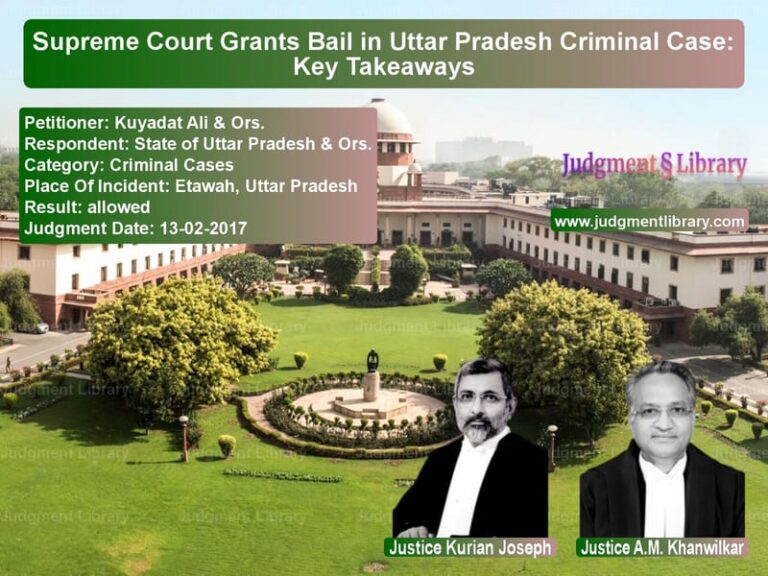Motor Accident Compensation: Supreme Court Restores Tribunal Award Under Section 163A
The case of Shivaji and Another vs. Divisional Manager, United India Insurance Co. Ltd. and Others revolves around the liability of an insurer under Section 163A of the Motor Vehicles Act, 1988, when the deceased driver himself was the victim of an accident. The Supreme Court was tasked with determining whether compensation should be granted to the legal heirs of a deceased driver in a no-fault liability claim under Section 163A.
Background of the Case
The appellants, Shivaji and another, were the parents of Shaji Shivaji Dudhade, who was the driver of a car (Registration No. MH-06/W-604) that met with an accident on June 15, 2010. The car collided with a truck (Registration No. KA-25/B-5363), resulting in the death of the driver, Shaji, as well as two other passengers, while two others suffered injuries.
The appellants filed a claim for compensation under Section 163A of the Motor Vehicles Act, which allows claims to be filed without proving negligence. The Motor Accident Claims Tribunal (MACT), Belgaum, allowed the claim and awarded Rs. 4,60,800 with an interest of 9% per annum.
The insurance company, United India Insurance Co. Ltd., appealed before the Karnataka High Court, which set aside the Tribunal’s decision. The High Court held that compensation under Section 163A is meant to protect innocent victims and does not extend to drivers responsible for accidents. The appellants, aggrieved by this ruling, moved the Supreme Court.
Petitioners’ (Shivaji and Another) Arguments
- Section 163A is a beneficial legislation that provides compensation on a no-fault basis.
- The insurance company could not deny compensation by raising a defense of negligence.
- Under precedents set by the Supreme Court, the insurer’s liability under Section 163A is absolute, and fault does not need to be proved.
- The High Court erred in setting aside the Tribunal’s ruling, which was in line with statutory provisions.
Respondents’ (United India Insurance Co. Ltd.) Arguments
- The claimants were seeking compensation for the driver, who was the tortfeasor and responsible for the accident.
- Section 163A does not apply to drivers responsible for accidents, as it is designed for innocent victims.
- The insurer is not liable when the deceased is the driver of the offending vehicle.
Supreme Court’s Observations
The Supreme Court examined precedents and the provisions of the Motor Vehicles Act. It noted that:
- In United India Insurance Co. Ltd. vs. Sunil Kumar, the Supreme Court had held that an insurer cannot plead negligence in Section 163A claims.
- The legislative intent behind Section 163A was to provide speedy and structured compensation without the burden of proving negligence.
- Allowing insurers to deny claims based on fault would defeat the purpose of the no-fault compensation scheme.
Supreme Court’s Judgment
The Supreme Court ruled:
- The Karnataka High Court’s judgment was incorrect and was set aside.
- The Tribunal’s award of Rs. 4,60,800 with 9% interest per annum was restored.
- The insurer cannot escape liability under Section 163A.
- The appeal was allowed, and compensation was reinstated in favor of the appellants.
Legal Precedents Considered
- United India Insurance Co. Ltd. vs. Sunil Kumar – Held that an insurer cannot avoid liability under Section 163A by claiming negligence.
- National Insurance Co. Ltd. vs. Swaran Singh – Established that statutory provisions governing compensation should be liberally interpreted.
- Deepal Girishbhai Soni vs. United India Insurance Co. Ltd. – Clarified the no-fault liability principle under the Motor Vehicles Act.
Impact of the Judgment
The ruling reaffirms that:
- Section 163A compensation applies regardless of fault or negligence.
- Insurance companies cannot deny compensation based on allegations of driver fault.
- The judgment provides financial protection to families of deceased drivers in motor accidents.
Conclusion
The Supreme Court’s decision in Shivaji and Another vs. United India Insurance Co. Ltd. ensures that claimants receive due compensation under Section 163A without having to prove fault. This ruling reinforces the no-fault principle and prevents insurers from evading liability based on technical grounds.
Petitioner Name: Shivaji and Another.Respondent Name: Divisional Manager, United India Insurance Co. Ltd. and Others.Judgment By: Justice Dipak Misra, Justice A.M. Khanwilkar, Justice Dr. D.Y. Chandrachud.Place Of Incident: Belgaum, Karnataka.Judgment Date: 09-08-2018.
Don’t miss out on the full details! Download the complete judgment in PDF format below and gain valuable insights instantly!
Download Judgment: Shivaji and Another vs Divisional Manager, Supreme Court of India Judgment Dated 09-08-2018.pdf
Direct Downlaod Judgment: Direct downlaod this Judgment
See all petitions in Motor Vehicle Act
See all petitions in Compensation Disputes
See all petitions in Negligence Claims
See all petitions in Judgment by Dipak Misra
See all petitions in Judgment by A M Khanwilkar
See all petitions in Judgment by Dhananjaya Y Chandrachud
See all petitions in allowed
See all petitions in Remanded
See all petitions in supreme court of India judgments August 2018
See all petitions in 2018 judgments
See all posts in Accident Cases Category
See all allowed petitions in Accident Cases Category
See all Dismissed petitions in Accident Cases Category
See all partially allowed petitions in Accident Cases Category

